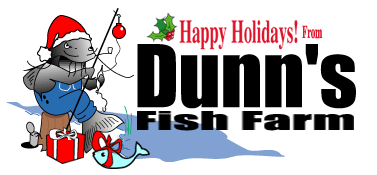Greetings!
All of us at Dunn's Fish Farm hope you and yours are
having a wonderful holiday season! Find below the
latest installment of our Pond & Lake Management
Newsletters. Now is the time to begin developing
your pond management strategies for the new
season. In the coming weeks you will receive more
tips and suggestions helping you make your pond or
lake as
productive as it can be!
|
 |
IT ALL STARTS HERE!
|
|
|
Just like on land, production in a pond starts
with
sunlight driving photosynthesis. Anything that
reduces the sunlight reaching a pond or otherwise
interferes with photosynthesis will reduce
productivity. Conversely, anything that increases
photosynthesis increases the pond productivity.
There are several factors that affect photosynthesis,
alone or in combination, and determine the basic
productivity of a pond.
|
 |
Water Quality, pH & Oxygen
|

|
The primary factor in pond production is the
quality
of the water. If a pond has not been limed, the
hardness and alkalinity may be too low to make
phosphorus available to the phytoplankton (one-
celled, microscopic plants that are the start of the
food chain). Also, the pH can vary enough to keep
the fish stressed and reduce growth rates. Ponds
that are not fertilized usually lack enough phosphorus
for maximum production of phytoplankton. Dissolved
oxygen levels need to be above 5 ppm (parts per
million) for fish to grow. They will start dying at
levels below 3 ppm, large fish first. This is usually
not a problem in the winter, but warm summer waters
may be saturated at only 5 ppm dissolved
oxygen.
|
 |
Turbidity
|

|
Turbidity, or how muddy the water is, will affect
production if it is to the point that it prevents
sunlight from penetrating water. For the same
reason, trees around a pond will shade the water,
reducing productivity. Turbidity is usually caused by
run-off into the pond. Also, if there is too much
watershed draining into the pond causing the water
to be completely exchanged every 30 days or less,
your fertilizer and lime will be washed out. In this
case, you may need to dig a diversion ditch for some
of the water.
Livestock watering at a pond
can cause muddy water and sloughing of the banks.
If possible, it is best to fence off the pond and water
the animals from a tank connected to the pond. The
Natural Resources Conservation Service, part of the
U.S. Department of Agriculture, in your area can help
with a design.
|
 |
Aquatic Vegetation
|

|
Aquatic weeds can affect production. You want
up
to 20% to 30% weed coverage to give small fish
some
cover. More than that and the pond will be hard, if
not impossible, to fish. Not only that, but weeds use
up nutrients that would otherwise be available to the
phytoplankton. Maintaining a “bloom” of
phytoplankton will shade out weeds, helping to keep
them under control. Also, water deeper than 3 feet
is too deep for most weeds, so the faster a pond
reaches this depth, the better. Steep banks can be
stabilized with riprap, which also provides cover for
small fish.
|
 |
Length of Growing Season
|
|
|
The length of the growing season will also have
an
affect on production. Essentially, the sun is more
intense the closer you get to the equator. This
translates into higher levels of photosynthesis, and
therefore primary production in a pond.
Also,
since fish are cold blooded, their metabolism is higher
and so they grow faster in warm water – up to about
85ºF. Bluegill in the southern states with longer
summers may spawn 4-5 times a year. In colder,
northern states they may only reproduce once a
year. Obviously, ponds with longer growing seasons
will be more productive.
|
 |
Conclusion
|

|
When looking for ways to improve the fish
production
in your pond, keep the basics in mind. Phytoplankton
undergoing photosynthesis is the start of the food
chain. Anything that favors this will increase the
productivity.
|
|
|

